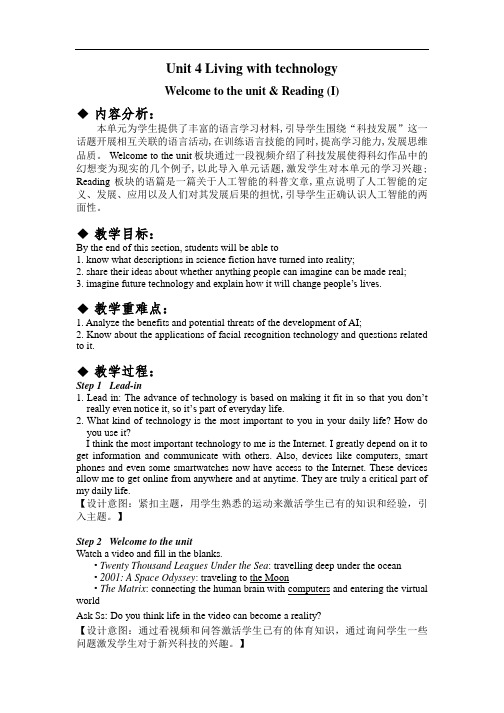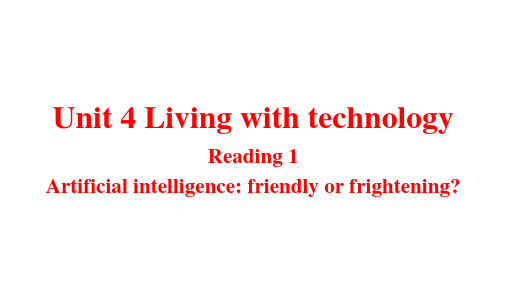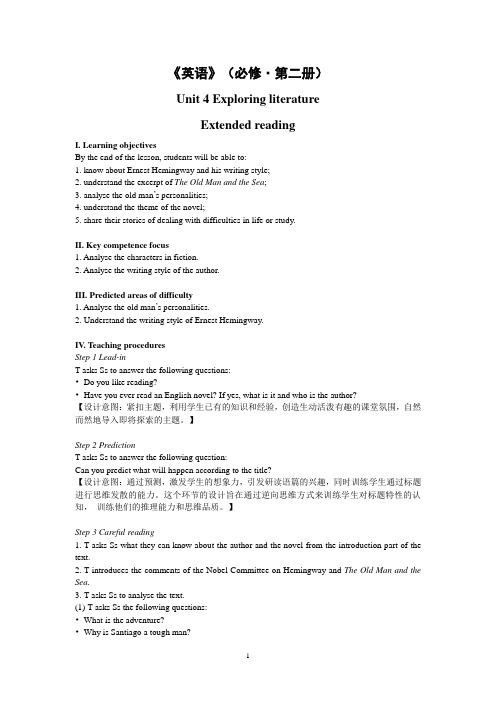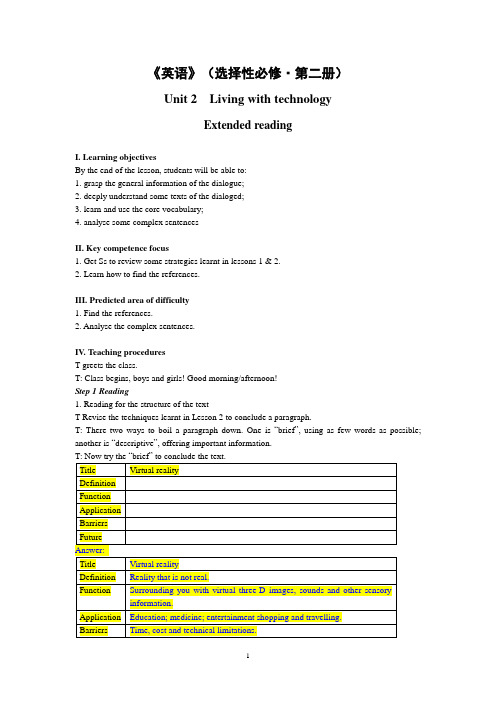译林版高中英语必修二Uint4 Reading (I)教案(雅礼版)
译林版高中英语选必二Unit4 Reading I 教案(雅礼版)

Unit 4 Living with technologyWelcome to the unit & Reading (I)◆内容分析:本单元为学生提供了丰富的语言学习材料,引导学生围绕“科技发展”这一话题开展相互关联的语言活动,在训练语言技能的同时,提高学习能力,发展思维品质。
Welcome to the unit板块通过一段视频介绍了科技发展使得科幻作品中的幻想变为现实的几个例子,以此导入单元话题,激发学生对本单元的学习兴趣; Reading板块的语篇是一篇关于人工智能的科普文章,重点说明了人工智能的定义、发展、应用以及人们对其发展后果的担忧,引导学生正确认识人工智能的两面性。
◆教学目标:By the end of this section, students will be able to1. know what descriptions in science fiction have turned into reality;2. share their ideas about whether anything people can imagine can be made real;3. imagine future technology and explain how it will change people’s lives.◆教学重难点:1. Analyze the benefits and potential threats of the development of AI;2. Know about the applications of facial recognition technology and questions related to it.◆教学过程:Step 1 Lead-in1.Lead in: The advance of technology is based on making it fit in so that you don’t really even notice it, so it’s part of everyday life.2.What kind of technology is the most important to you in your daily life? How do you use it?I think the most important technology to me is the Internet. I greatly depend on it to get information and communicate with others. Also, devices like computers, smart phones and even some smartwatches now have access to the Internet. These devices allow me to get online from anywhere and at anytime. They are truly a critical part of my daily life.【设计意图:紧扣主题,用学生熟悉的运动来激活学生已有的知识和经验,引入主题。
译林版高中英语必修二Uint4 Reading (II) 教案(雅礼版)

Unit 4 Exploring literatureReading (II)◆内容分析:本板块的话题是“文学作品”。
Reading板块引导学生探究优秀文学作品的特征,思考阅读文学作品的好处。
语篇节选改编自英语作家威廉·约瑟夫·朗恩的著作《英语文学:历史及其对英语世界生活的意义》。
文章介绍了文学作品的定义和功能,描述了优秀文学作品的三大特点:即刻画真与美,让读者产生共鸣并激发其想象,以及拥有经久不衰的生命力。
◆教学目标:By the end of this section, students will be able to:1.find the three qualities of literature by skimming the article;2.give an example to support an idea;3.point out the cohesive devices applied in the article;4.appreciate beautiful sentences from the article; understand the significance ofreading literature in daily life.◆教学重难点:1.understand some new words and expressions.2.be able to use the new words and expressions correctly.◆教学过程:Step 1 Lead-inRead and underline the following key words and expressions.amaze, unnoticed, in store for sb., appeal to, be capable of, awaken, in the presence of, permanence, adaptStep 2 Building vocabulary1. Word study: amazeIntroduce the meaning of “amaze” through different situations, first the context of the speech and then other situations.(1) Different meanings of amaze(2) Collocations of amaze(3) Variations of the word “amaze”(4) Exercises of amaze: Practice makes perfect.2. Word study: unnoticedIntroduce the meaning of “unnoticed” through different situations, first the context of the speech and then other situations.Example sentences that include the word “unnoticed”3. Word and phrase study: in store for sbIntroduce the meaning of “in store for” through different situat ions, first the context of the speech and then other situations.(1) Collocations of “in store for”(2) Exercises of “in store for”: Practice makes perfect.4. Word and phrase study: appeal toIntroduce the meaning of “appeal to” through different situati ons, first the context of the speech and then other situations.5. Phrase study: be capable ofIntroduce the meaning of “be capable of” through different situations, first the context of the speech and then other situations.6. Word study: awakenIntroduce the meaning of “awaken” through different situations, first the context of the speech and then other situations.(1) Different meanings of awaken(2) Collocations of awaken(3) Exercises of awaken: Practice makes perfect.7. Phrase study: in the presence ofIntroduce the meaning of “in the presence of”.8. Word study: permanenceIntroduce the meaning of “permanence” through different situations, first the context of the speech and then other situations.(1) Different meanings of permanence(2) Collocations of permanence(3) Exercises of permanence: Practice makes perfect.9. Word study: adaptIntroduce the meaning of “adapt” through different situations, first the context of the speech and then other situations.(1) Different meanings of adapt(2) Collocations of adapt(3) Exercises of adapt: Practice makes perfect.Sentence analysisLet a little song appeal to the ear, or a great book to the heart, and we discover a new world, a world of dreams and magic. (lines 8-9)Sentence translationConsolidation1. Exercises to review the knowledge learned2. Check the answers of B1 on P47教学反思。
2020新译林版高中英语选择性必修二Unit 4 Reading1课件

Pre-reading
The second picture describes a machine playing go with humans, which demonstrates a significant advance in deep-learning AI systems.
The third picture depicts a scene where a robot is having a conversation with a human being, suggesting that one day machines may have the ability to respond not only to human language but also to human feelings.
Para. 4
__________Байду номын сангаас_
Para. 5
____________
Para. 6
____________
While reading
Para 2: AI is a branch of computer science that aims to create intelligent machines imitating the complex networks of the human brain.
译林版高中英语必修二Unit 4 Reading (II) 教案

《英语》(必修·第二册)Unit 4 Exploring literatureReading (II)I. L earning objectivesBy the end of the lesson, students will be able to:1. understand the usage of the following words and expressions: appeal (to), determine, significant, description, reflect, capable (be capable of), contain, element,(in) summary;2. use the above words and expressions in new situations;3. understand synonyms and antonyms;4. give examples to support ideas.II. Key competence focus1. Understand some new words and expressions.2. Use the new words and expressions in new situations.III. Predicted area of difficultyUse the new words and expressions correctly.IV. Teaching proceduresStep 1 Lead-inReview the main points of the article.T: Hello, everyone! We’ve learned an article which describes the wonder of literature. We need to understand the significant qualities of literature if we want to enjoy and understand it. What are the qualities of literature? Would you fill in the blanks according to what you have learned?【设计意图:回归课本,回忆文章,为下一步的词汇学习进行铺垫。
译林版高中英语选必四Unit4 Reading I 教案(雅礼版)

Unit 4 Never too old to learnWelcome & Reading I◆内容分析:本单元的主题语境是“人与自我”,话题是“活到老学到老”,涉及的语篇类型是说明文等。
本单元的教学旨在帮助学生培养终身学习的优秀品质,提升责任意识,树立正确的价值观念和人生态度,促进自我成长。
Welcome to the unit板块通过介绍三种学习的模式,以此激发学生对单元话题的探究欲望。
Reading板块通过说明文体,展示了学习的必要性和终身学习的好处,引领学生树立正确的学习观。
◆教学目标:By the end of this section, students will be able to:1.interpret the quote highlighting the importance of lifelong learning;2.understand some important details;3.form their own opinions based on the magazine article◆教学重难点:1. Learn how to use the given information to express oneself;2. Learn how to get a deep understanding of the reading material.◆教学过程:Step 1 Lead-inHow do people learn? What is your learning style?1. VisualThese students think in pictures and learn best from visual displays. Think about the students who can produce sentences easily when looking at images.2. AuditoryStudents remember the tone, pitch and speed of speech well. Think about the students who respond well to songs and can recite them well.3. VerbalStudents respond well to opportunities to interact with words and sounds through discussions and asking questions.4. PhysicalThese students love learning through interacting with objects, enjoying doing experiments and making things.5. LogicalStudents enjoy collecting, analysing data and solving problems. Think about students who like puzzles and sentence jumbles.6. Social (社交型)These are students who are often very verbal and enjoy conversation activities. Think about the students who are the most talkative around school.7. Solitary (独自型)These students like to study alone and can often be mistaken as shy. Think about the students who are often capable of finishing group activities on their own.Which style is the best one?Maybe we all learn in a way that integrates several styles and this chart will shed some light on the suitable way to learn and remember the knowledge we acquired.The Learning Pyramid shows how well learners can remember content after two weeks with different learning styles.Step 2 Before Reading1. Why do you think learning is important?Learning is important to our survival and development. We are born with basic survival instincts, but to continue surviving in our world we must learn a variety of things such as social behaviour and intellectual knowledge. We must also learn to adapt to the ever-changing world and what we learn throughout our lives influences our physical, mental, intellectual and social development. Besides, acquiring new knowledge and skills can be fun because it opens up opportunities to different experiences.2. What would you do when learning is tough and frustrating?Faced with this situation, I would try to be patient with myself first. If being patient does not help, I would change my method of learning. For example, instead of reading about a topic, I could look for a video on the topic to watch. Finally, I would make sure I am maintaining a good balance between my studies and my free time activities. By applying various strategies, I will ensure that I improve my learning efficiency and face any challenges positively.Step 3 While Reading: Read for structureStep 4 While Reading: Read for details1.What does “this” in Line 5 refer to?It means appreciating how much, as an individual, you don’t know.2.What will you be exposed to as you progress through life?You will be exposed to many new ideas, beliefs, practices and learning experiences.3.Why are critical thinking skills important according to the author?They prevent you from blindly accepting new ideas.4.How can we take advantage of opportunities for lifelong learning?We must follow it up with a review process of analysis, evaluation and improvement.Step 5 Post readingWhat can we do to become a lifelong learner?Step 6HomeworkFinish B1 on P5.Surf the Internet and learn more about O. Henry and his short stories.◆教学反思。
译林版高中英语必修二Unit 4 Extended reading 教案

《英语》(必修·第二册)Unit 4 Exploring literatureExtended readingI. Learning objectivesBy the end of the lesson, students will be able to:1. know about Ernest Hemingway and his writing style;2. understand the excerpt of The Old Man and the Sea;3. analyse the old man’s personalities;4. understand the theme of the novel;5. share their stories of dealing with difficulties in life or study.II. Key competence focus1. Analyse the characters in fiction.2. Analyse the writing style of the author.III. Predicted areas of difficulty1. Analyse the old man’s personalities.2. Understand the writing style of Ernest Hemingway.IV. Teaching proceduresStep 1 Lead-inT asks Ss to answer the following questions:•Do you like reading?•Have you ever read an English novel? If yes, what is it and who is the author?【设计意图:紧扣主题,利用学生已有的知识和经验,创造生动活泼有趣的课堂氛围,自然而然地导入即将探索的主题。
译林版高中英语选必二Unit4 Extended reading 教案

《英语》(选择性必修·第二册)Unit 2 Living with technologyExtended readingI. Learning objectivesBy the end of the lesson, students will be able to:1. grasp the general information of the dialogue;2. deeply understand some texts of the dialoged;3. learn and use the core vocabulary;4. analyse some complex sentencesII. Key competence focus1. Get Ss to review some strategies learnt in lessons 1 &2.2. Learn how to find the references.III. Predicted area of difficulty1. Find the references.2. Analyse the complex sentences.IV. Teaching proceduresT greets the class.T: Class begins, boys and girls! Good morning/afternoon!Step 1 Reading1. Reading for the structure of the textT Revise the techniques learnt in Lesson 2 to conclude a paragraph.T: There two ways to boil a paragraph down. One is “brief”, using as few words as possible; another is “descriptive”, offering important information.2. Reading for extended information B P54T: What other applications of VR do you know about?Answer:Virtual reality in the courtroom: Lawyers usually use photos to try to explain the mechanics of a crime or an accident to a jury. It is challenging to show the judge and jury what actually happened at a crime scene or at the precise moment of impact during a serious accident. With VR, lawyers are now able to transport them directly into the scene of the crime or accident.Virtual reality in sport: Athletes use this technology to fine-tune certain aspects of their performance and VR is also used in the design of sporting clothes and equipment, such as running shoes. Virtual reality has been used to improve the audience’s experience of a sporting event too, like walking through a stadium, or even taking part in a game or an event.…【设计意图:本单元一个阅读策略是“理解文章结构”,此步承接第一课,复习这一策略并运用这一策略来理解本文结构。
高中英语译林版《必修第二册》教案讲义:Unit 4 Exploring literature

Section ⅣWriting——书籍的推荐1.写作任务假定你是李华,你和你的朋友打算在学校创办一个英语读书俱乐部,请写信给你的美国朋友Peter,介绍一个俱乐部的创办目的和运作情况,希望对方提出建议。
注意:(1)词数80左右;(2)文章开头和结尾已给出,不计入总词数;(3)可以适当增加细节,以使行文连贯。
Dear Peter,How is everything going?____________________________________________________________________________________________________________________________________________________________________________________________________________________________________________________________________________________________________________________________________________________________________________________________________________________________________________________________________________________________________________________________________________________________________________________________________________________________________________________________________________________________________________________________________________________________________________________Yours,Li Hua2.写作思路(一审、二定、三明确、四分段)(1)一审:确定写作体裁和主题体裁:应用文——建议信主题:介绍读书俱乐部创作目的和运作情况,并寻求建议(2)二定:确定时态和人称时态:一般现在时为主人称:第一人称(I)和第二人称(you)(3)三明确:明确写作要点创作目的→运作情况→寻求建议(4)四分段:结合写作要点,分为三个段落3.素材整理(1)关键词语①创作目的:widen our horizons,determine to do②运作情况:buy appealing books,chances to do,exchange opinions, a range of, in an attempt to do③寻求建议(2)完成句子①我写信寻求你对我们英语读书俱乐部的一些建议。
- 1、下载文档前请自行甄别文档内容的完整性,平台不提供额外的编辑、内容补充、找答案等附加服务。
- 2、"仅部分预览"的文档,不可在线预览部分如存在完整性等问题,可反馈申请退款(可完整预览的文档不适用该条件!)。
- 3、如文档侵犯您的权益,请联系客服反馈,我们会尽快为您处理(人工客服工作时间:9:00-18:30)。
Welcome to the unit & Reading (I)
内容分析:
本单元的主题语境是“人与社会”,话题是“文学作品”,涉及的语篇类型有:议论文、推荐信、小说(节选)、海报。本单元的教学,旨在帮助学生认识阅读文学作品的意义,体验文学作品的魅力。
3.Rhetorical, anadiplosis and simile and other rhetorical devices are introduced in different paragraphs.
【设计意图:考察学生对文本细节的理解】
Step 5 Discussion
Read paras. 3–6 and figure out the pattern of the structure.
2.Reading for structure: PEEL structure
PEEL: point, explain & expand, example & evidence and link.
David CopperfieldandThe House on Mango Streetare distinctively two types of books. However, these two excerpts both express a positive outlook in the face of adversity.
Step 4 Detailed Reading
1.Read and figure out the answers.
Read paras. 1-2 and answer the questions.
(1)What does the man stand for?
(2)What does the child stand for?
【设计意图:问学生如何了解文学类型,通过讨论上述学生感兴趣的话题,引导学生通过讨论,初步思考文学名著有什么样的特征,培养学生预测性思维能力。】
Step 3 Fast Reading
Figure out the genre and the structure of the article.
【设计意图:指导学生通过找主题句快速获取段落主旨,概括段落大意和分析文章结构,培养学生的概括能力和分析能力。】
Discuss in groups to talk about your favourite work of literature by the three qualities.
My favourite work of literature: __________
The reason I like it: __________
Summary: ___________
【设计意图:要求学生从三个文学的三个素养对文学作品展开讨论,学以致用。】
Teaching Notes:
1.know about the structure, the figure of speech and writing skills used in the text;
2.express their opinions on what qualities a great work of literature should have;
教学过程:
Step 1 Lead-in
1.Literature genres
Great literature is timeless and timely. Each takes a stand in history in various types or genres. Let’s take a look at the four major literature genres:poetry, drama, fiction and non-fiction.
Three qualities: __________
Its description of truth and beauty: __________
Its appeal to our feelings and imagination: ___________
Its permanence: __________
(3)How is the story of the child and the man related to the topic of literature?
Read paras. 3–5 and finish the chart.
Finish a chart of the qualities of literature.
本单元卷首语的引言出自埃兹拉·庞德,意为:“伟大的文学只不过是在最大程度上承载意义的语言。”埃兹拉·庞德是美国著名的诗人和文学评论家。这句话说明文学语言承载着丰富的内涵,阅读文学作品时我们要认真揣摩和体会。
教学目标:
By the end of this section, students will be able to:
3.talk about their favourite work of literature by the three qualities.
教学重难点:
1.Analyze the writing skills used in the text.
2.Talk about their favourite work of literature by the three qualities.
Read the excerpts from two famous works of literature and discuss the following questions in pairs.
What message is conveyed in the two excerpts?
Are these two books the same type? Do these two excerpts show anything in common?
【设计意图:通过阅读文学名著的摘录,引出本节课话题,启发学生思考,从而激发学生的阅读兴趣。】
Step 2 Pre-Reading
Ask the students the following questions:
What qualities do you think a great work of literature should have?
【设计意图:介绍五种文学体裁,引导学生讨论喜欢的文学类型。】
2.Quote sharing:
Great literature is simply language charged with meaning to the utmost possible degree. ---Ezra Pound
3. Welcome to the unit
Ask students to have a discussion about their favorite literature.What’s your favourite work of literature? Who’s your most beloved author? Would you please introduce one of your favourite books?
整个单元的八个板块分别涉及“文学作品”的多个层面。Welcome to the unit板块以两个节选自名著的段落来激发学生对于文学的探究欲。Reading板块引导学生探究优秀文学作品的特征,思考阅读文学作品的好处。本板块的任务是“名著选段赏析”,教材选取了查尔斯·狄更斯的《大卫·科波菲尔》和桑德拉·希斯内罗丝的《芒果街上的小屋》的两个语段。这两段文字都反映了对生活充满热情的积极人生态度,诠释了面对逆境时应有的心态,与学生生活密切相关。通过对这两段文字的赏析,可以激发学生进一步探究本单元话题的兴趣,为单元学习做好热身。
